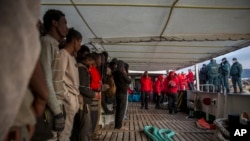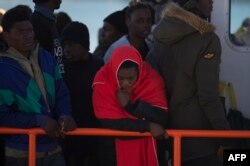The Netherlands announced Wednesday it was prepared to welcome some of the 32 migrants waiting to disembark from a Dutch-flagged vessel in the Mediterranean, if other countries did the same.
"The Netherlands has indicated a readiness to possibly take in a proportional number of migrants who are on board Sea-Watch 3, on condition that other European countries do the same," said security and justice ministry spokesman Lennart Wegewijs.
Boats allowed to 'take shelter'
And late Wednesday, Malta's navy announced that authorities would allow two German NGO ships — the Sea-Watch 3 and Sea-Eye — carrying migrants to "take shelter" in Maltese waters due to the deteriorating conditions on board.
The Dutch had at first joined Italy, Malta and Spain in refusing to accept the migrants who were rescued on December 22 by Sea-Watch 3, which is operated by a German charity.
The 32 migrants on the Sea-Watch 3 who were plucked from a makeshift boat in international waters, include three young children, three unaccompanied adolescents and four women from Nigeria, Libya and Ivory Coast.
The Sea-Eye has been stranded in the Mediterranean with 17 migrants on board.
In Berlin, a government spokesman said Saturday that Germany would only accept some of the migrants if other European countries also agreed to do so.
Meanwhile Spanish coast guards reported Wednesday they had rescued 401 migrants trying to cross the Mediterranean over the first two days of the new year.
The news comes just days after a charity rescue vessel carrying 311 mainly African migrants plucked off the coast of Libya docked in Spain, ending a traumatic journey which saw them spend Christmas at sea.
Spain a leading destination
With Italian ports closed to migrants by the Rome government since June, Spain has become a leading destination.
A spokeswoman for Spain's coastguards told AFP they had rescued 111 migrants on Tuesday. She added 290 more were saved on Wednesday, and coastguards were searching for another boat in distress.
More than 1,300 migrants died trying to reach Italy or Malta via the central Mediterranean last year, according to the International Organization for Migration.





